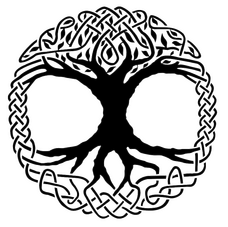
Tirnath Tribe
᚛ᚈᚔᚏᚅᚐᚈᚆ ᚈᚏᚔᚁᚓ᚜
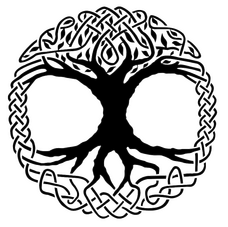
"The forest grants us hearth and shelter, and in turn, we must strive everlong to protect and nurture it."
Basic Information
Tribe Name:
Clan:
Territory:
Tongues:
Type:
Religion:
Governance:
Chieftain:
Fate Shaman:
Tirnath
Veena
Western Forest, Skatay Range
Common, Gaelcic
Territorial
Animism
Chiefdom
Fljotu Tirnath
Martreth Tirnath
Characteristics
Physical Characteristics
Viera of the Tirnath look much the same as other Veena, with a few distinctions. Most tend to be on the taller side, with dark hair and blue or green eyes. Shades of blonde and red hair are uncommon, but not unheard of, particularly amongst the women of the tribe.Tirnath tend to spend most of their time outdoors, but because the skies near their village tend to be shrouded by the deep forests and the mountains that rise above them, their skin tones are not overly tanned or pale.
Clothing
Tirnath clothing tends to be warm and practical, as the climate tends to be rather cold so near to the Skatay Range. Most of their clothing is made from furs and strong fabrics, almost always accompanied by a heavy cloak. They favor boots made of leather or throng-bound fur, with Tirnath women still wearing the heeled footwear common to their race.While their traditional garb tends to utilitarian, jewelry is very popular among the Tirnath. Pins and broaches are seen everywhere, as are armbands, ankle-bands, rings and necklaces all adorned with the Trinath's traditional intricate knotwork patterns.
Culture
The Tirnath have existed for thousands of years and hundreds of generations, hidden away in their forest village beneath the mountains of the Skatay Range. As such, they have a rich cultural history and a number of traditions that shapes their way of life and informs their outlook on the world.
Village
Tirnath
The village is the namesake of the tribe, and thus is known as Tirnath, located deep within a mountain valley of the Skatay Range, where it blends into the surrounding forest. The village itself is built beneath the shroud of the great trees, with wooden bridges and stone walkways that connect the various hillocks of the village.Tirnath knotwork is carved into the trunks of the great forest trees that surround the village, along with totemic imagery sacred to the Tirnath. The structures of the village are primarily built from wood and stone, and small watchtowers are populated throughout the settlement. A river runs through the center of the village, ending in a waterfall that continues on through the valleys below.
Ildythach
At the center of the village lies the great tree known as 'Ildythach' - or 'Multicolored Tree' in the common tongue - which is considered sacred by the Tirnath. It takes its name from the multicolored leaves that adorn the tree, often colors of red, blue, green, and purple.The Tirnath believe Ildythach is a conduit of ancient magic, and their ancestors were chosen to guard the tree from despoilers. Those of the tribe who wield magic believe they draw their power from Ildythach itself, a gift granted to them for centuries of protection.
The Cave of Thuinn
Behind the waterfall flowing from the mountain river lies the Cave of Thuinn, home to the shaman of the Tirnath. The Tirnath believe the cave to be a sacred place where the loom of fate is spun, and many a young Tirnath will visit the cave to gain insight into their destiny.Numerous cairns are built throughout the cave, surrounding the hearth that rests at the center of the cave. The Tirnath shaman live within a small dwelling at the back of the cave.
Rites and Rituals
The Wood-Mist
The Tirnath believe there is a secret language in nature, and from those who are able to read it nothing in the world may be hidden, for all things are interconnected and everything is reflected in everything else. Nature displays its treasures for all to see, but unfolds in ways that few can ever fully comprehend, changeless only in its ever-changing evolutions, devolutions, and revolutions.The Tirnath call this the "Wood-mist" and by studying this language, they may glimpse even deeper secrets in nature that enshroud mysteries yet unknown to the world. The Wood-mist is but an extension of the natural aether that permeates their forested home, and some Tirnath believe that the Wood-mist can be read anywhere that the presence of aether is strong.
Wild Hunt
With their fervent belief in the looms of fate, the Tirnath have an ancient rite known as the "Wild Hunt", a term that denotes a highly important personal quest that calls them to venture out into the world. Although considered sacred and an aspect of the Green Word, only those Tirnath deemed to possess great destinies hear the call of the Wild Hunt.The nature of these quests is unique to each Tirnath, and the first hints of a Wild Hunt are felt within the Wood-mist, and the calling manifests as a feeling deep within their souls. Those on a Wild Hunt consider it paramount and would die in service to their quest. Though these quests are personal, they are thought to benefit the tribe as a whole upon completion, and some Tirnath will undertake several Wild Hunts over the course of their life.
Tattoos
The Tirnath have an ancient tradition of tattooing, often in the style of Tirnath knotwork and geometric imagery. Tirnath receive their first tattoos upon their coming of age, and certain designs are unique to male and female, denoting their diverging paths in adulthood.Tirnath receive more tattoos throughout their life, often after an important event or great personal achievement. Tattoos can also represent bloodlines or evoke the memory of ancient Tirnath heroes of legend. Whatever the specific designs may be, it is believe that these tattoos help to balance the soul and prevent an unkind fate.
Oral Tradition
The Tirnath maintain a system of runic writing, but they have an expansive oral tradition of storytelling and lyrical verse. Legends of ancient Tirnath heroes are retold in the spoken word as great epics, and individual families often have traditional tales that are passed from generation to generation. They also have a love of poetry and song, and many Tirnath are taught to sing from a small age.As well as passing down the history of the tribe, important lessons of life are imparted through their stories and songs. For as many that are meant to inspire and guide, there are an equal amount that act as cautionary tales of hubris and recklessness, and warn young Tirnath against paths that lead to dark fates.
Religion
The Tirnath practice a form of animism that emphasizes the importance of guardian spirits, often considered to be feminine or motherly in nature, and the spirits present in all the facets of nature.The chief spirits, known as the "Mother Spirits", are connected to the land, the waters, and sovereignty, and are often seen as the oldest ancestors of the Tirnath. They are maternal figures caring for the earth itself as well as their descendants, but also fierce defenders, teachers and warriors. These spirits are not divided by singular purviews of power, such as "love" or "fire", but instead are viewed as holistic beings with areas of specialty. In this way, they are difficult to compare to the deities of other lands.Alongside the Mother Spirits, the Tirnath hold that the flora and fauna around them are possessed of spiritual power. Chief among these spirits are the spirits of the woods, which are said to possess the foremost amount of power, followed by the spirits of animals. All other spirits are said to draw their strength from the fundamental power of nature.
Cuisine
Culinary Traditions
With a society built around hunting and gathering, food has become an important aspect of Tirnath life. Much of their food is prepared in cauldrons above hearth fires, or campfires in the case of the Tirnath men. Roasting spits above an open fire is also common.The main meal is eaten in the afternoon or evening, though morning meals are common for hunters. Celebratory meals were often held at night, usually as part of a feast eaten with the whole village. However, most meals are eaten with the immediate family within their dwelling.
Ingredients
The primary proteins used in Tirnath cooking are fish and meats from the native fauna of the forested mountain valleys, primarily venison and wild boar. Meats tend to be flavored with honey, or served alongside berries, either whole or in the form of jam. Stews are also incredibly common.Vegetables commonly used include onions, chives, cabbage, celery, wild garlic and leeks. Aside from various cultivars of berries, apples, pears, cherries, and plums are common fruits. Dairy is also important, with milk, butter, curds, and cheese staples of the Tirnath diet, often served alongside bread. Honey is commonly used, both to flavor dishes and in the making of mead, their favored alcoholic drink.
Tribal Structure
Tribal Leaders
The leader of the Tirnath holds the title of Chieftain, always a female per Viera custom. Often a warrior or hunter, she is looked upon to maintain adherence of the Green Word within the tribe, as well as the various facets of the Tirnath's individualized code and traditions. Few as they often are, it is her duty to settle any tribal disputes or pass judgment upon those who go against the Green Word.The Chieftain is advised by a small council of the tribe's eldest matriarchs, who sit at the Chieftain's side during tribal meetings and assist in minor duties of leadership. In spiritual matters, the Chieftain looks to the shaman and often convenes with fate in the Cave of Thuinn.
Shaman
Religious leaders among the Tirnath are known as shaman. They are led by the Fate Shaman, always a woman of an ancient Tirnath bloodline that is gifted with the power of foresight. Tirnath shaman are known as mysterious and ethereal, and their words carry the weight of fate itself.Shaman are tasked with tending to the cairns that exist throughout the Tirnath's territory, and holding vigil within the Cave of Thuinn. They are called upon to interpret the words of the spirits and guide Tirnath who hear the call of the Wild Hunt in understanding its purpose.
Warfare
Weaponry
The Tirnath are fierce and swift warriors, skilled at fighting within the dense forests and mountain valleys. Their preferred weapons include spears, short bows, and swords, and they are unforgiving in battle, trained in ancient traditions of war.Their weapons are often adorned with Tirnath knotwork, upon haft, hilt, and blade, with each Tirnath warrior considering their weapons to be sacred and they are treated with utmost care. The tribe also has a long tradition of warriors naming their weapons, usually after some great deed done in battle.
Scáth Fénnid
Like all Viera, Tirnath males live apart from the village as protectors of the forest, and their Wood-warders are among some of the fiercest known to their people. However, only a fated few of these Wood-warders are strong enough to become part of a secretive sect of their ways known as scáth fénnid - translated into the common tongue as 'shadow warriors'.Trained in fighting techniques passed down from their ancestors, these warriors bind themselves to ancient forest spirits of vengeance and wield magics of darkness and shadow. Clad in black armor, Scáth Fénnid wield scythe-like weapons in battle, and they understand their forest homes like no other. Believing themselves to take on the face of the forest itself, they are seldom seen without their heavy hoods and foreboding helms, and only those with the blessing of the woods know their true visage. Even other Wood-warders know to fear them, for their coming means only death.
Gall Óglaigh
Tirnath warriors who find themselves in the wider world - either through a Wild Hunt or breaking of the Green Word - often find work as mercenaries and call themselves gall óglaigh. Although the term translates into the common tongue as 'foreign warriors', they are known more simply as 'gallowglass' due to the unique pronunciation of the Tirnath's tribe tongue.Those who know the gallowglass know them as fierce warriors with unwavering honor. They rarely take up jobs that would dishonor either themselves or the tribe, and so many are often employed as personal bodyguards to honest merchants or respectable noble houses. However, others still do join with mercenary companies, and those who have broken the Green Word may consider their views on honor differently.
Relations
Like all Viera, the Tirnath traditionally shun all contact with the world beyond the forests, in accordance with the Green Word. However, there are times when a Wild Hunt may bid a Tirnath beyond the forest, and so long as they are granted leave by the Chieftain, those who leave in this manner are not considered to have broken the Green Word.Tirnath will often trade with other Veena villages within the Skatay Range and its forested foothills, though even other Veena must be wary of the Tirnath's fiercely protective Wood-warders. When trade does happen, it is welcoming and hospital, and other Viera known to be friends fo the Tirnath are offered shelter and lodging within the village.
Tribesfolk
Fljotu Tirnath
Chieftain
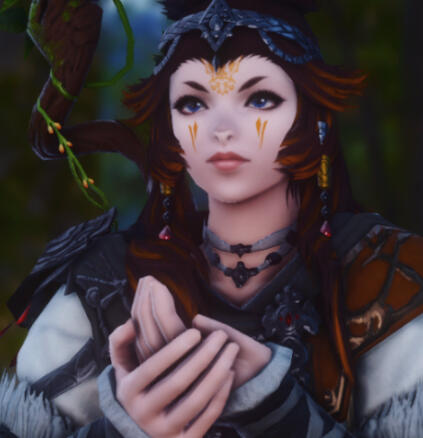
Protective, kind, and nurturing, Fljotu is the Chieftain of the Tirnath, a woman of a storied bloodline. A gifted sorceress, she is known for her affinity with the magics of earth and wood, and her utmost dedication to the well-being of the tribe. Her words are never spoken idly, and a spell nary cast astray.
Martreth Tirnath
Fate Shaman
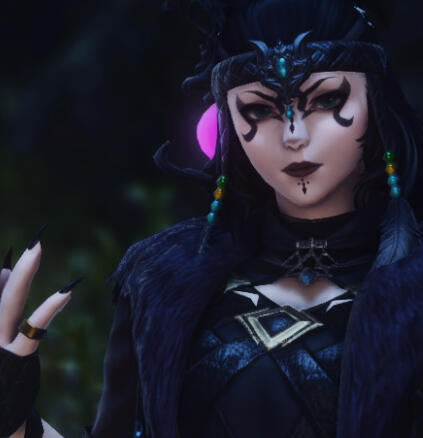
Martreth is the current Fate Shaman of the Tirnath, and the most powerful sorceress of the tribe. Compared to Fljotu, she is mysterious and severe, though her care for the tribe is true. Her skill with prophecy is unmatched, and her portents and omens bring fortune and ruin alike.
Hrafn Tirnath
Wood-warder
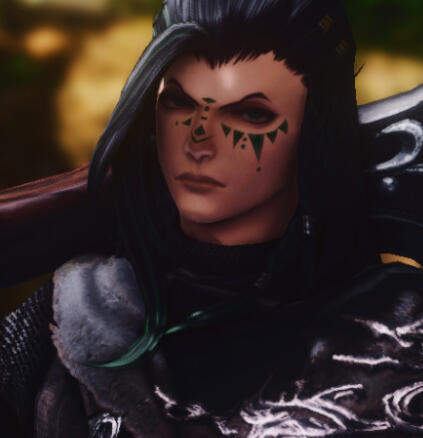
Hrafn is the son of Martreth, and is equally as mysterious and severe. He is a master Wood-warder and the Tirnath's greatest warrior, the most feared of those who bear the title of scáth fénnid. Like his mother, he possesses prophetic ability, though he prefers to deliver his omens upon the battlefield.
Ildun Tirnath
Huntress
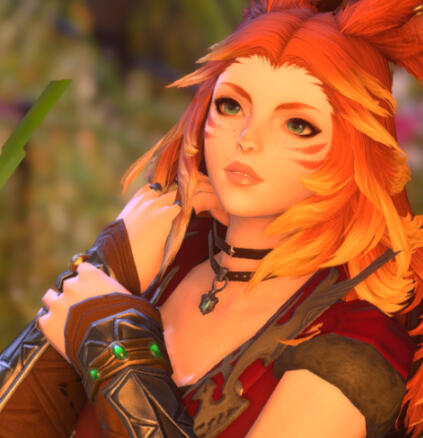
One of the finest bards amongst the Tirnath, Ildun is an adventurous free spirit and one who has heard the call of the Wild Hunt. With a friendly and free demeanor, she is a skilled huntress who wields her bow alongside a mastery of fire and water magics.
Dimmyr Tirnath
Shaman
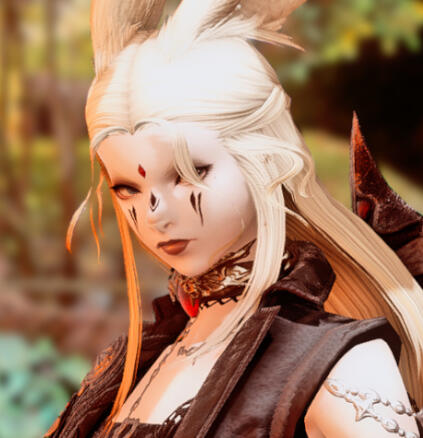
Dimmyr is Martreth's foremost acolyte, and is thought by many to become Fate Shaman of the Tirnath in time. Often mistaken for Hrafn's sister, given their similarities, she is an equally enigmatic woman who walks the path of the Wild Hunt with an iron resolve and powerful magics.
Runa Tirnath
Beekeeper
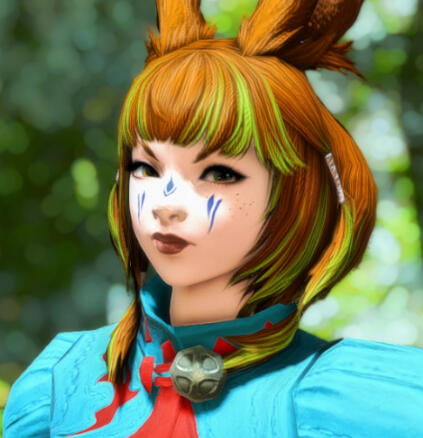
Another of the Tirnath to have been roused by the call of the Wild Hunt, Runa is far less martially inclined than her kin. Nevertheless, she plays a vital role in the village, ensuring that the Tirnath's apiary's are well-kept and that the bees are treated well. She is a skilled artisan and brewer of mead.










